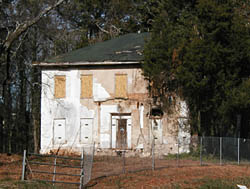Judge William Wilson House
In today's article we are going to talk about Judge William Wilson House, a topic that has generated great interest in recent years. Since its emergence, Judge William Wilson House has captured the attention of experts and fans alike, and has proven to have a significant impact on different aspects of society. Throughout this article, we will explore the different facets of Judge William Wilson House, from its history and evolution to its influence on the world today. Additionally, we will examine the different perspectives and opinions related to Judge William Wilson House, with the aim of offering a complete and diverse view of this topic. Without a doubt, Judge William Wilson House is a topic that leaves no one indifferent and that continues to generate debate and reflection in different areas. Join us on this journey of discovery and exploration of Judge William Wilson House!
Judge William Wilson House | |
Formerly listed on the U.S. National Register of Historic Places | |
 Judge William Wilson House | |
| Location | 621 Fairburn Rd., SW, Atlanta, Georgia |
|---|---|
| Area | 15 acres (6.1 ha) |
| Built | 1856 |
| Architectural style | Greek Revival |
| NRHP reference No. | 80001078 |
| Significant dates | |
| Added to NRHP | February 15, 1980 |
| Removed from NRHP | November 27, 2020 |
The Judge William Wilson House was an antebellum house in Atlanta, Georgia. It was built on land in a community west of Atlanta that was then called Adamsville which Wilson had inherited from his father William "Dollar Mill" Wilson (1775–1839) in 1839, and as the area around it developed came to be located in the Fairburn Heights neighborhood, a suburban area west of the Perimeter (I-285). At the end, it was one of only a few remaining antebellum structures still standing in its original location within the Atlanta city limits.
The house was built in the Greek Revival style between 1856–1859 and was the main house of a plantation that, at twelve hundred acres, was one of the largest in the area. The house was used during the Battle of Atlanta by Union General William Tecumseh Sherman as a temporary headquarters. After the war, William Asbury Wilson (1824–1903) served as a representative in the Georgia General Assembly, as a justice of the inferior court in Fulton County, and as the county's sheriff. The house remained in the Wilson family into the 1962 when the great grandson of the builder sold the property to the Holy Family Hospital who used it as housing for their nurses. Its final use was as a community center. By 2011 the house was disused, the roof was falling in and there were cracks in the stone walls. In that year it was added to the Atlanta Preservation Center's "Most Endangered Properties" list. The unannounced demolition of the house in December 2015 "came as a surprise" to the preservation community, who had hoped to stabilize the building until other plans could be made to save it.
References
- ^ "National Register Information System". National Register of Historic Places. National Park Service. July 9, 2010.
- ^ "Judge William Wilson House", National Park Service – National Register of Historic Places Travel Itinerary – Atlanta
- ^ Rhetta Akamatsu, "Atlanta's endangered historic properties: The Judge William Wilson House", Examiner.com, August 3, 2011
- ^ "Atlanta antebellum mansion now a pile of rubble". The Atlanta Journal-Constitution. Retrieved 2017-01-25.



